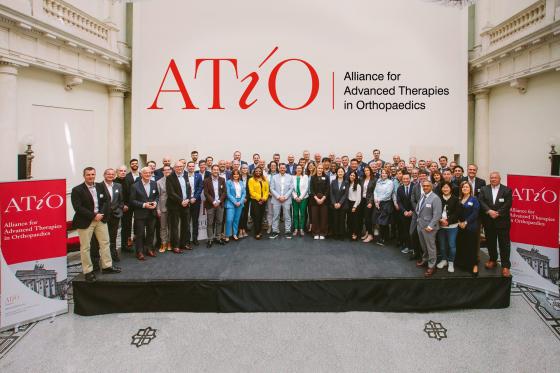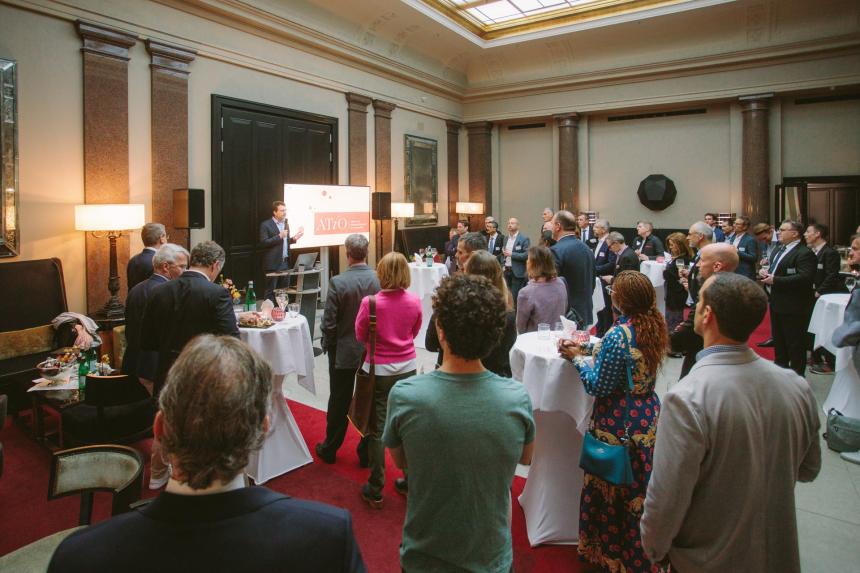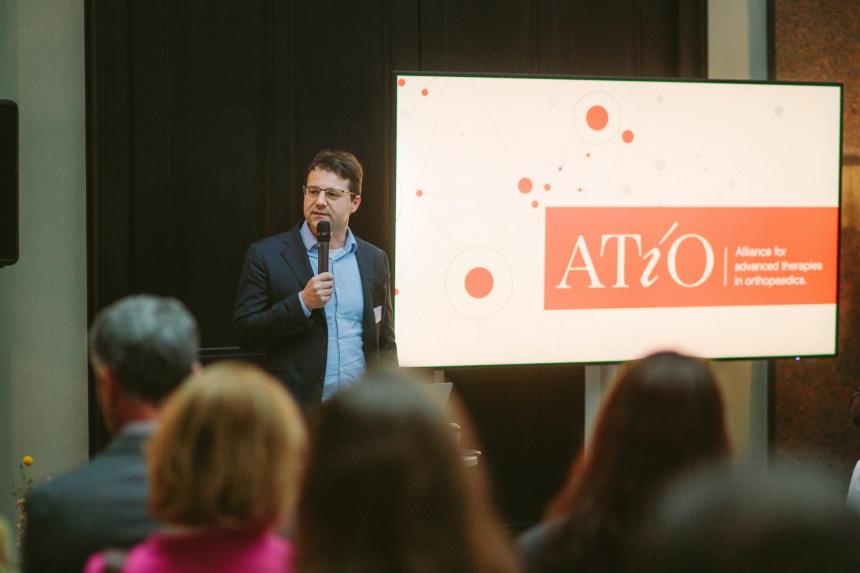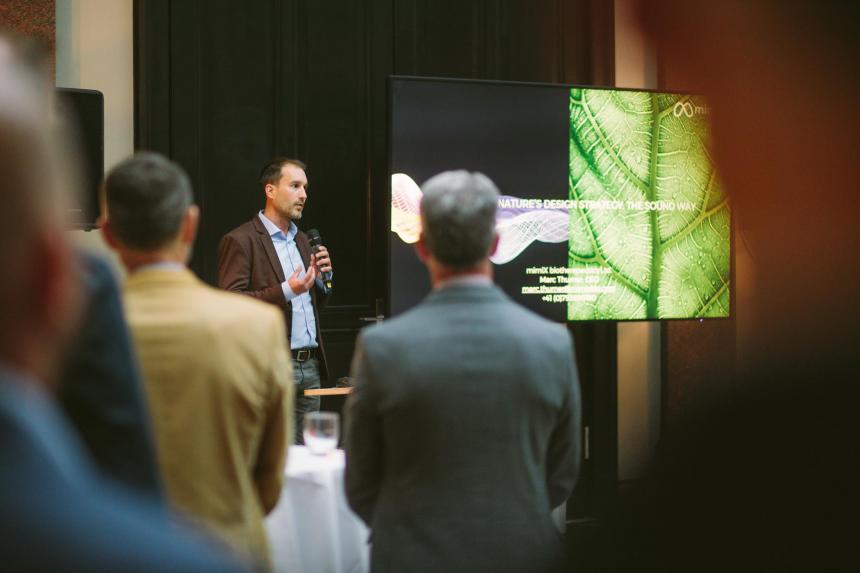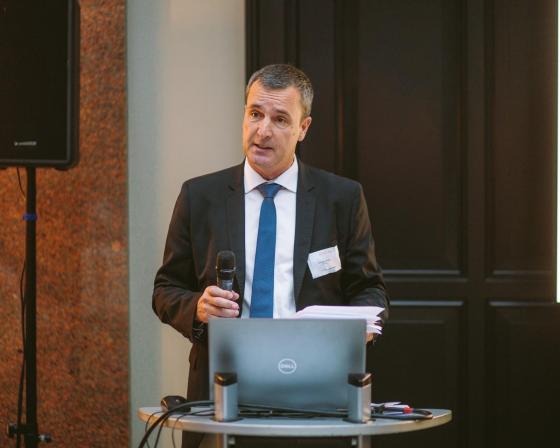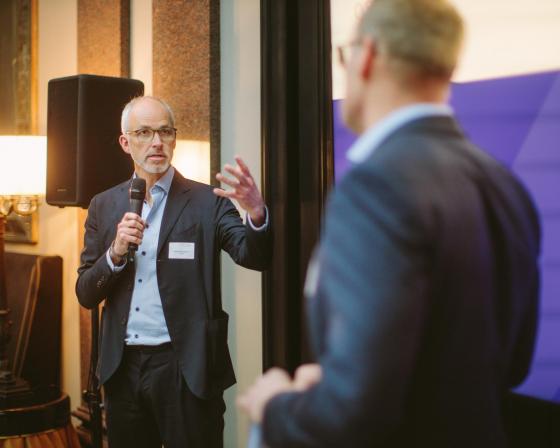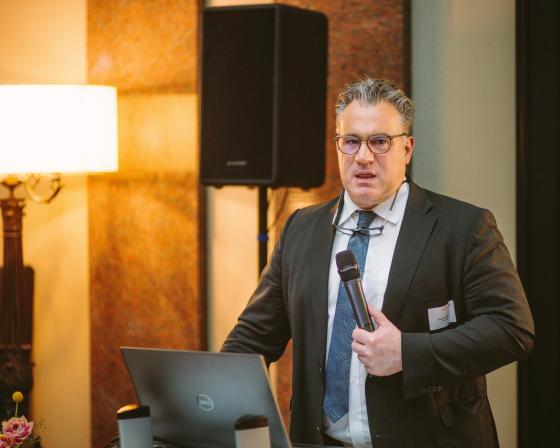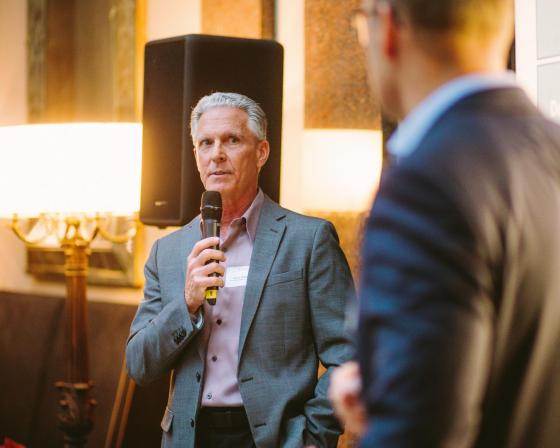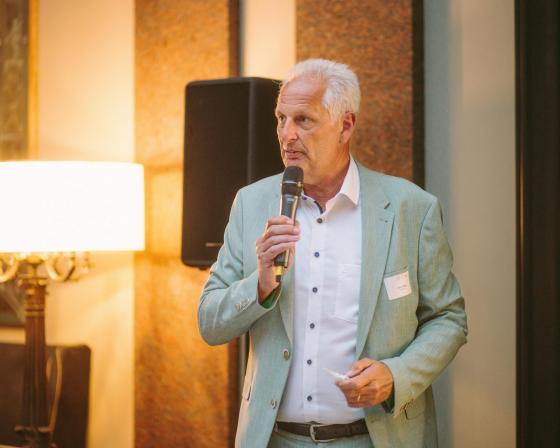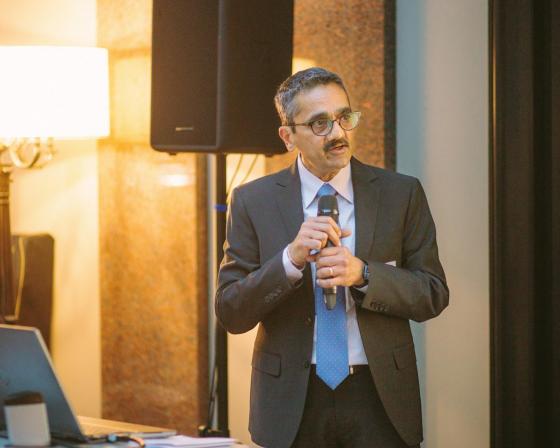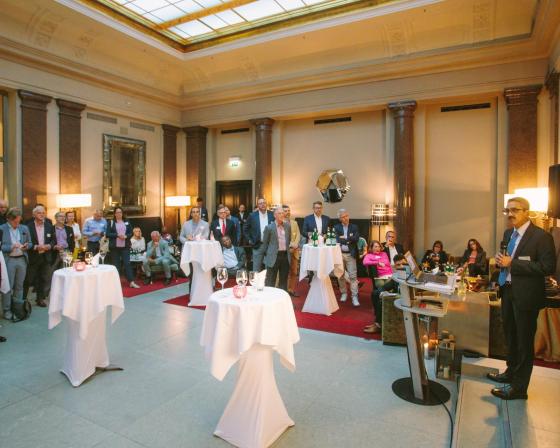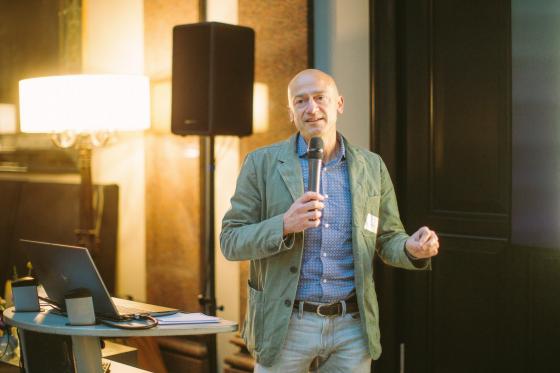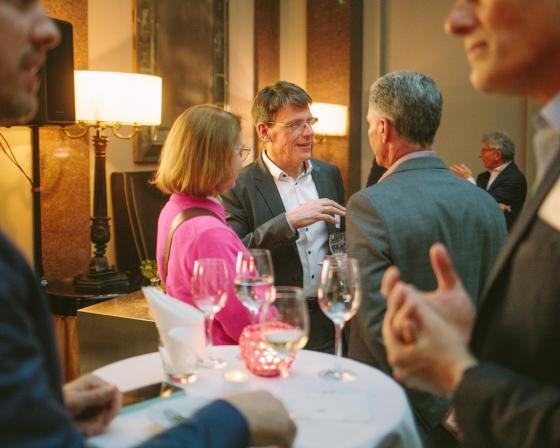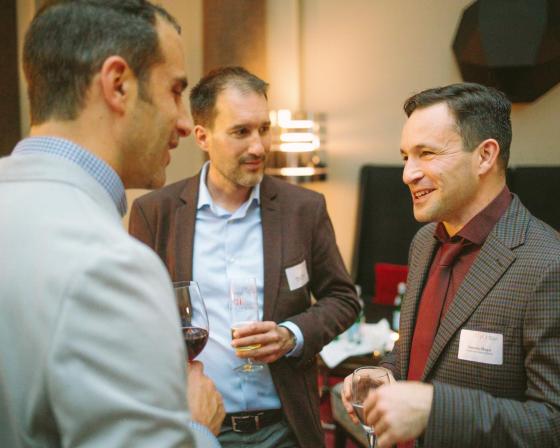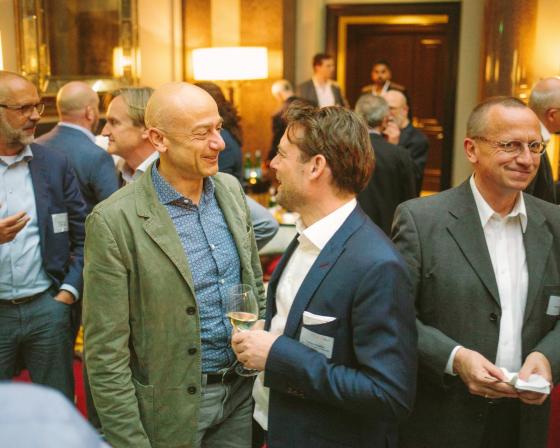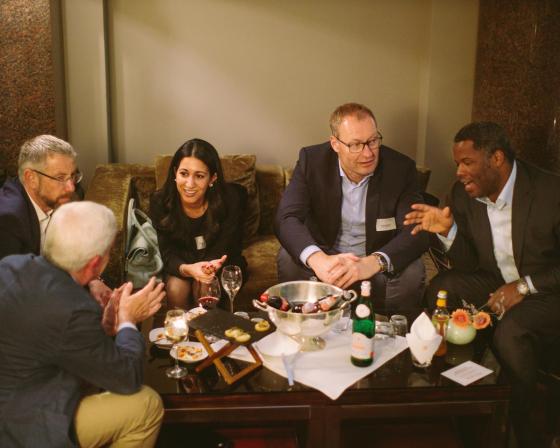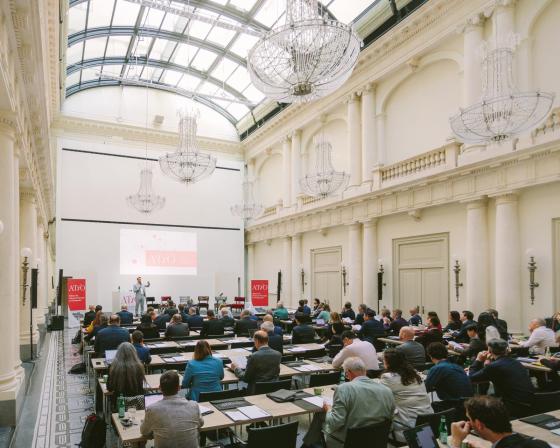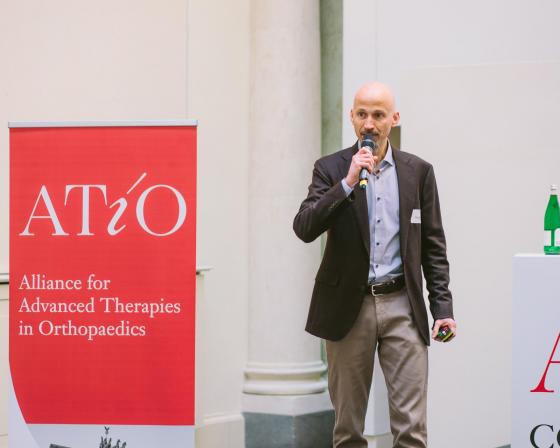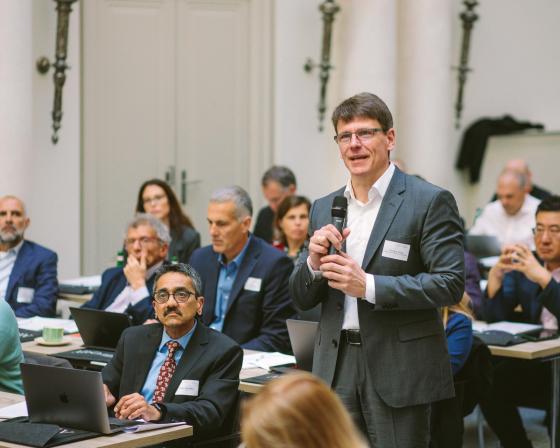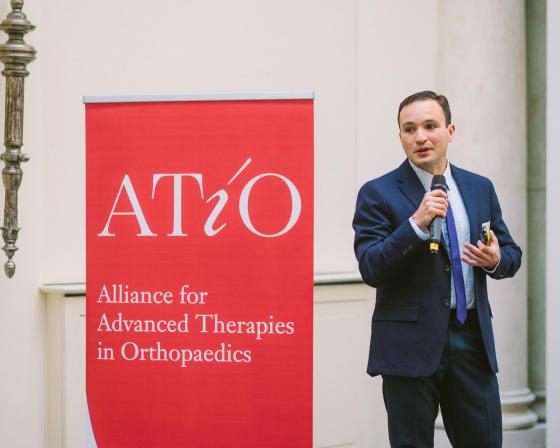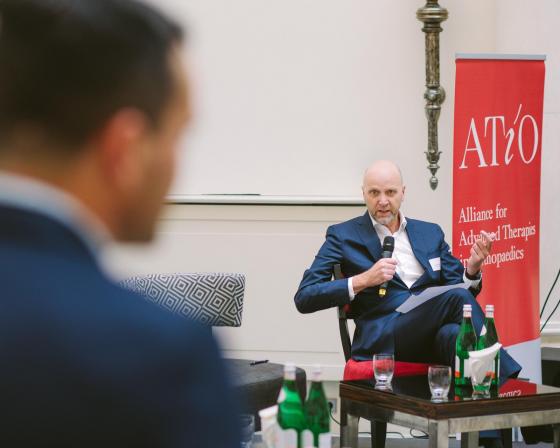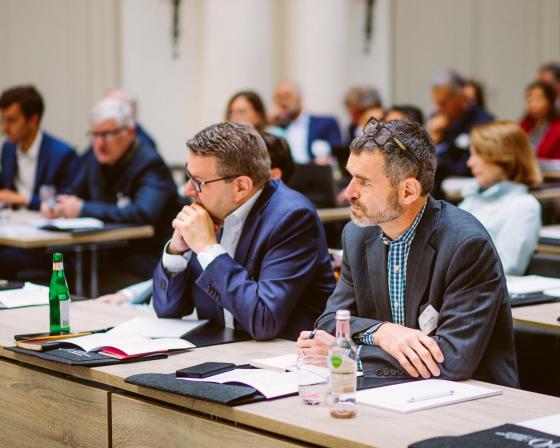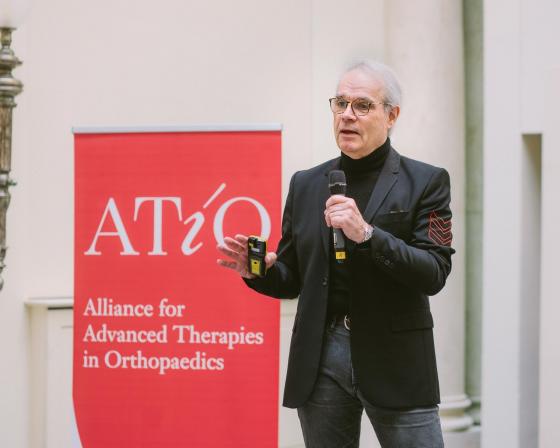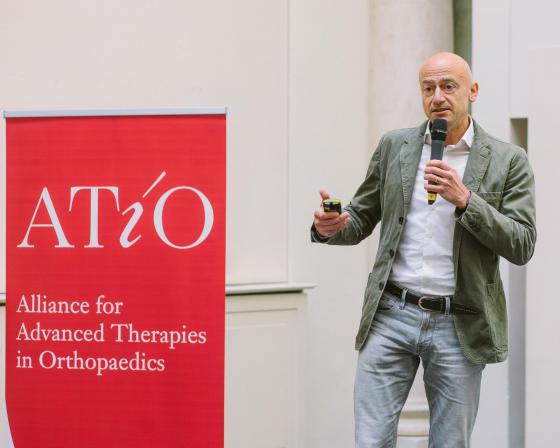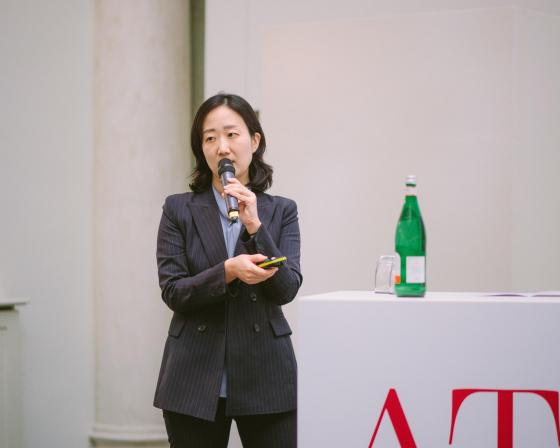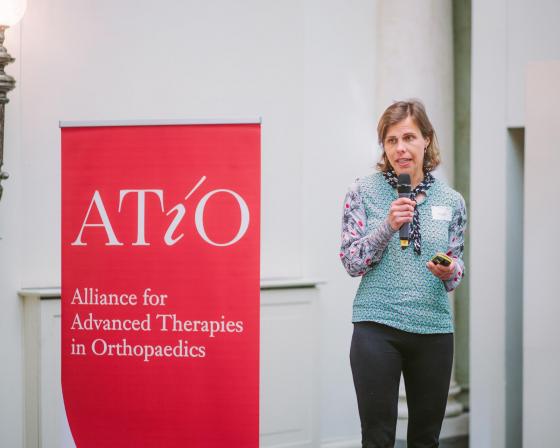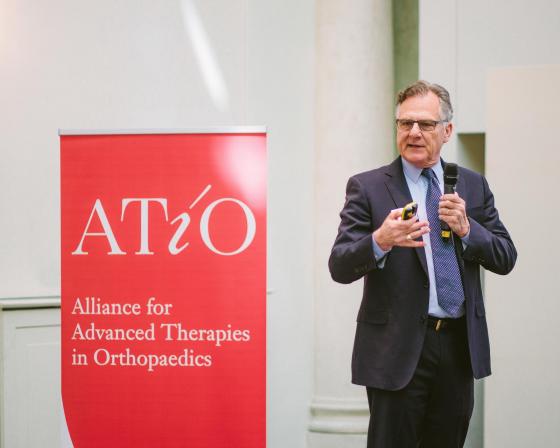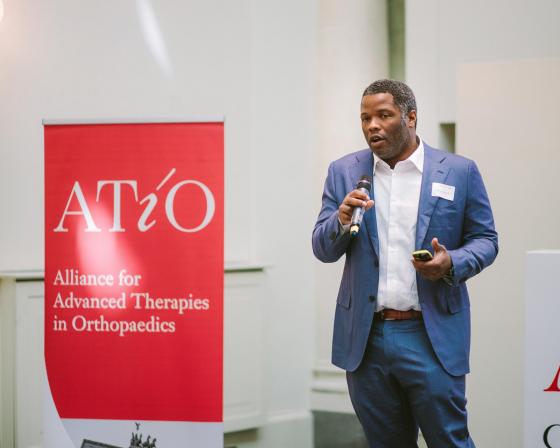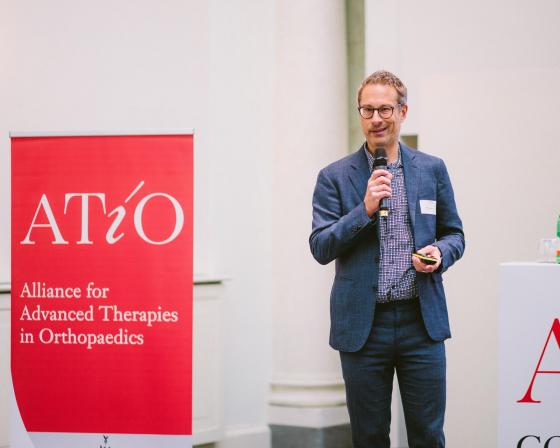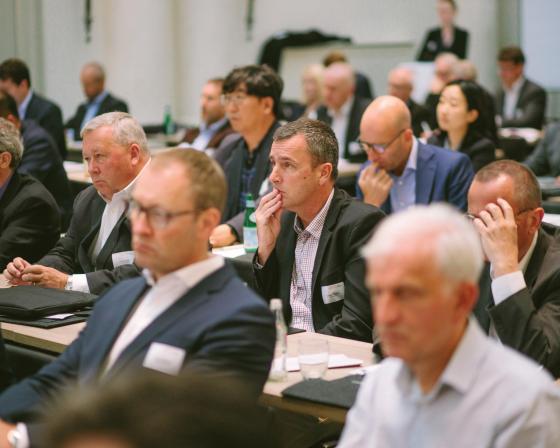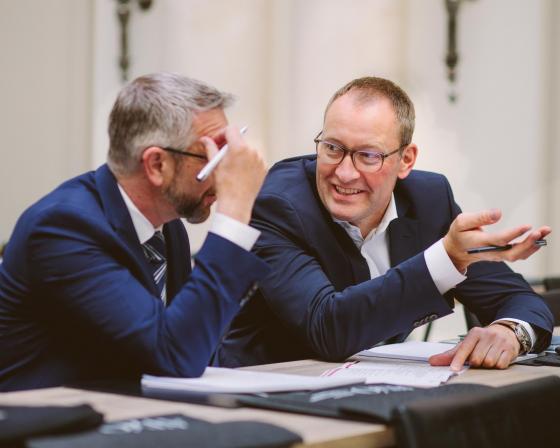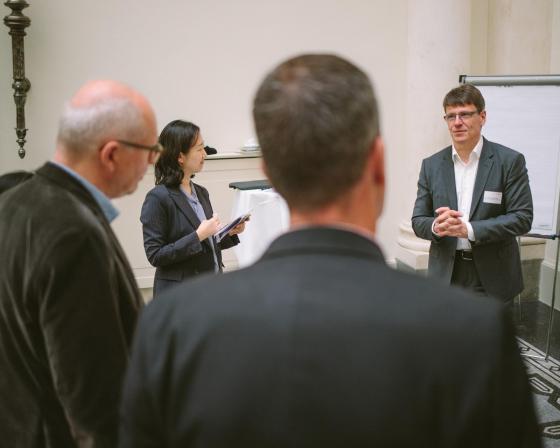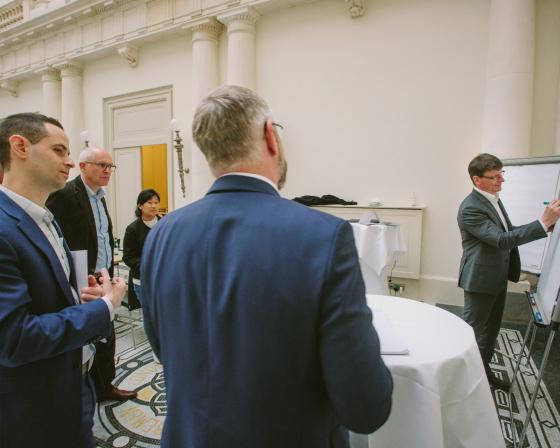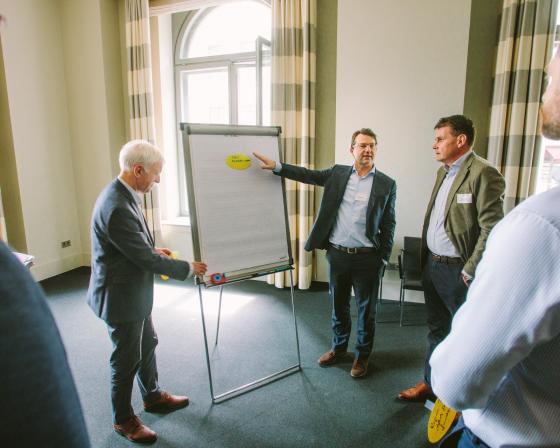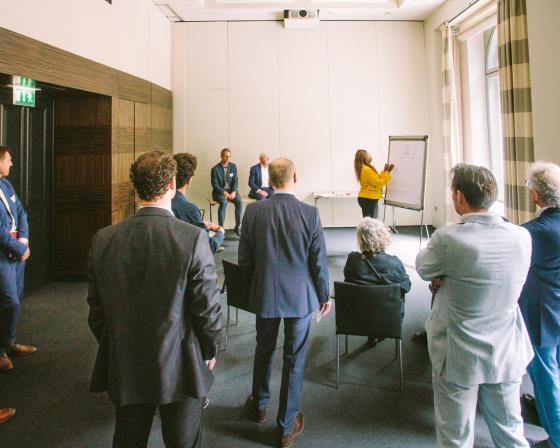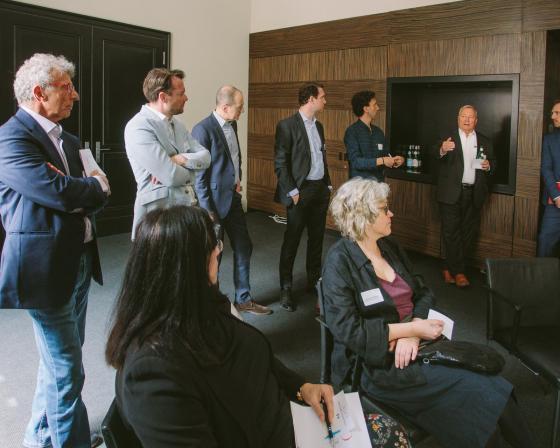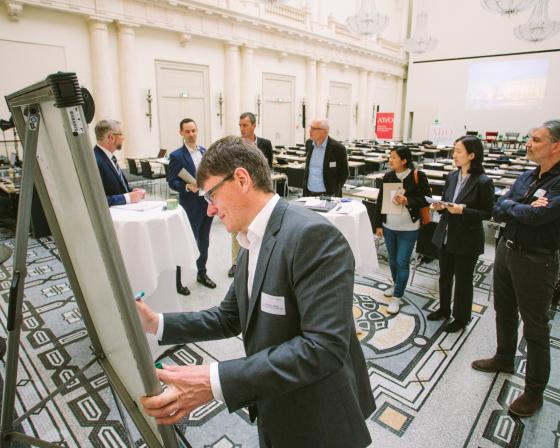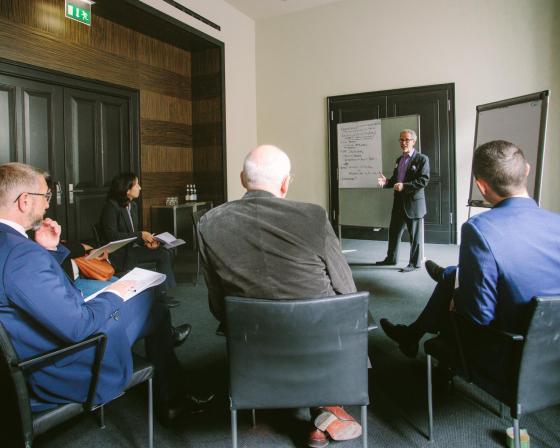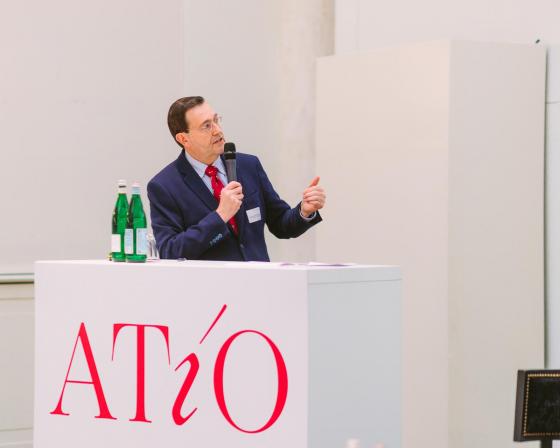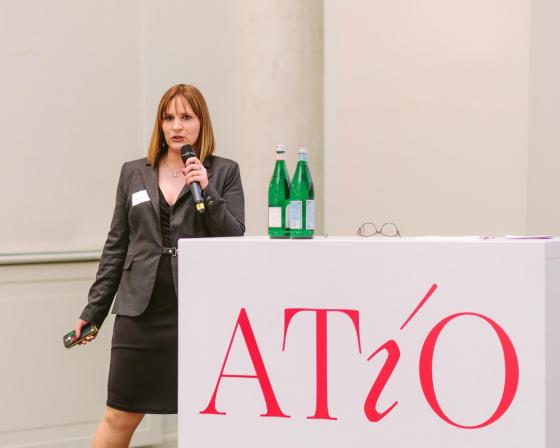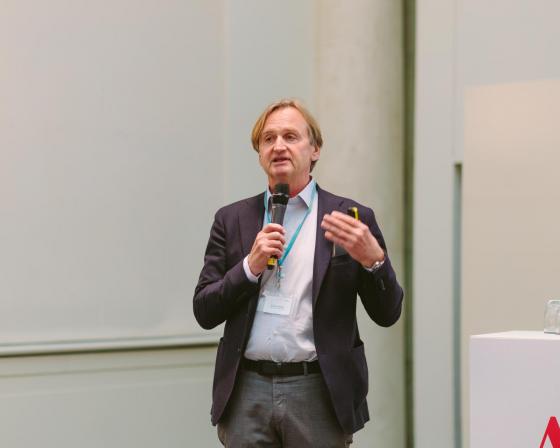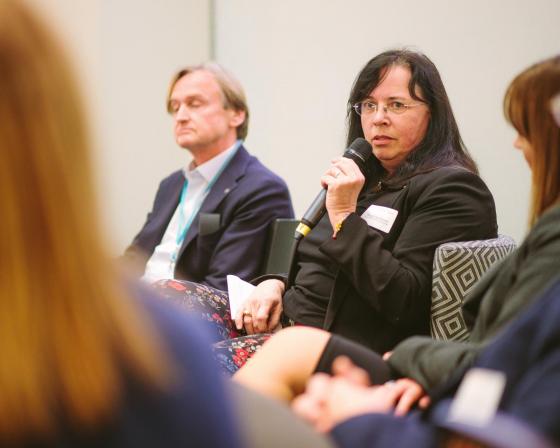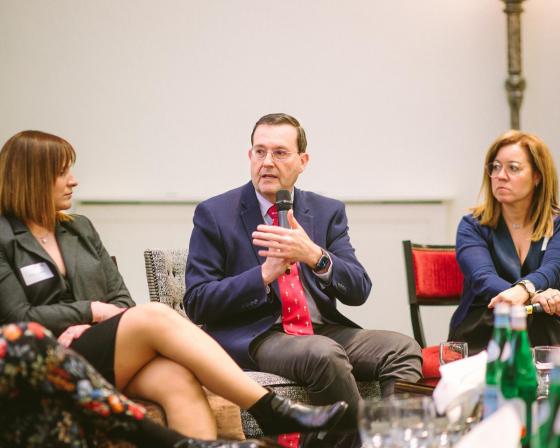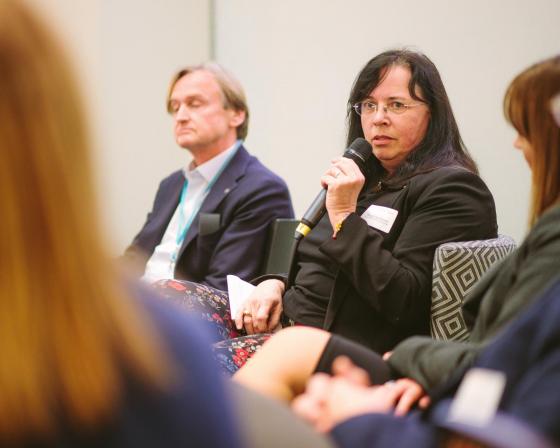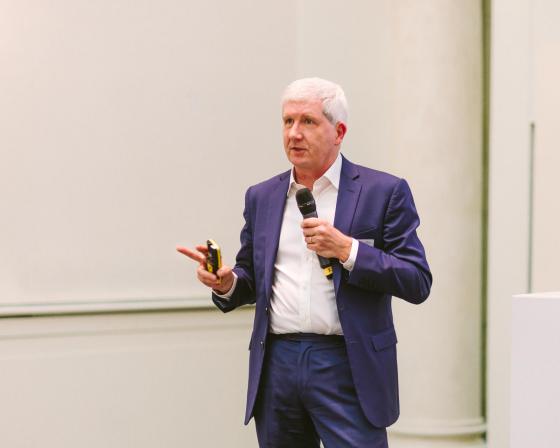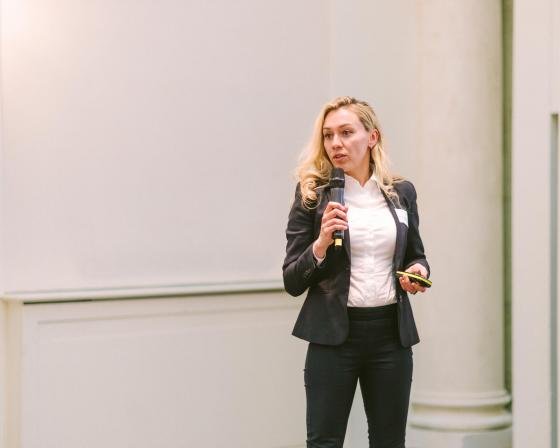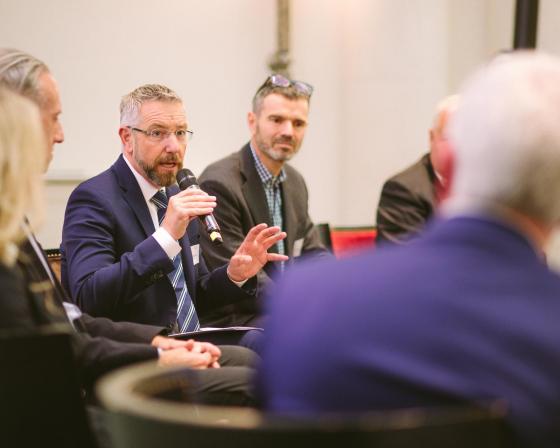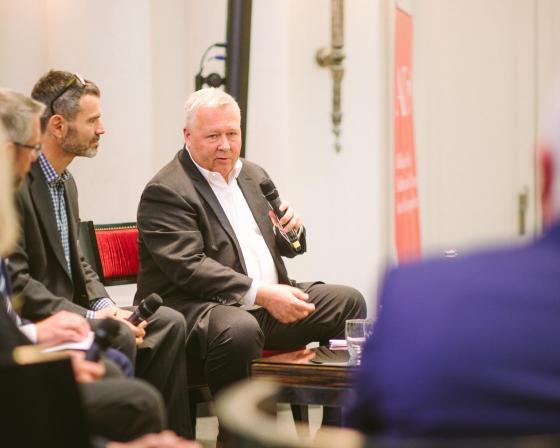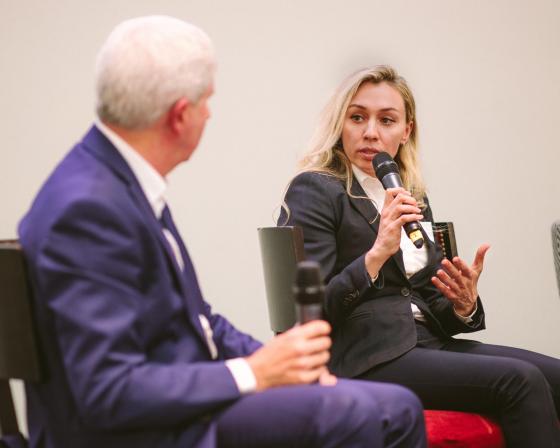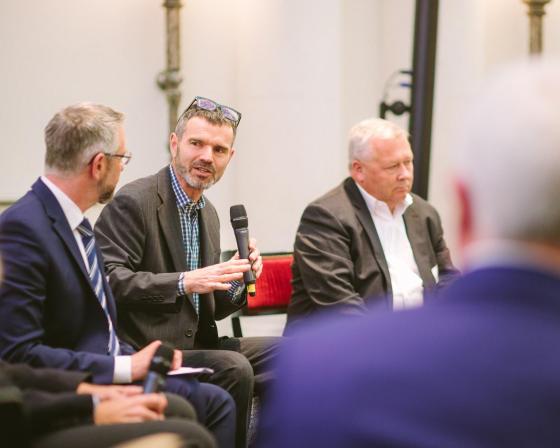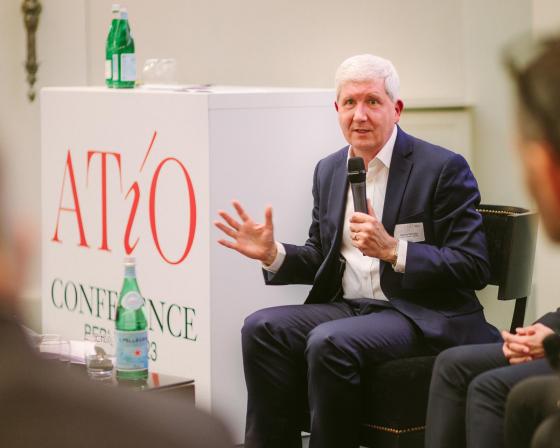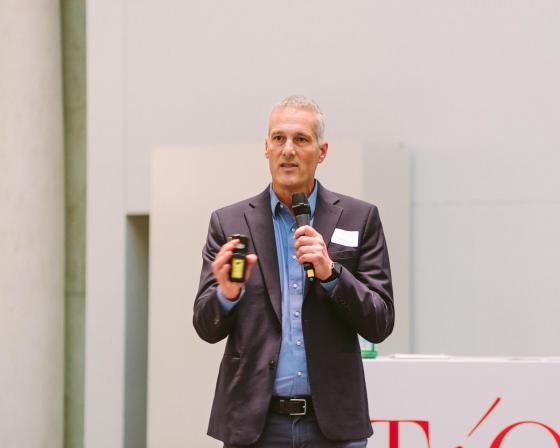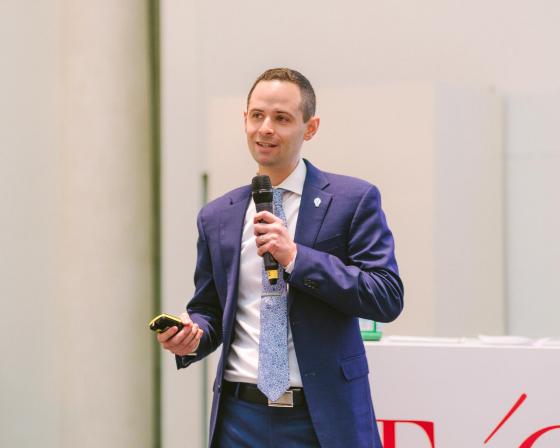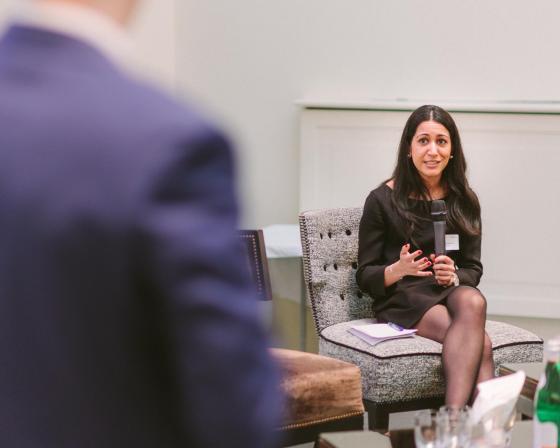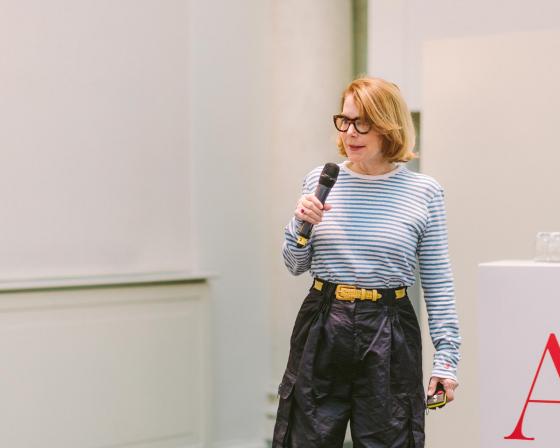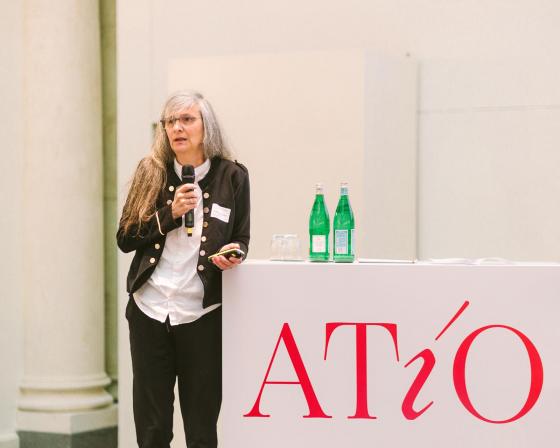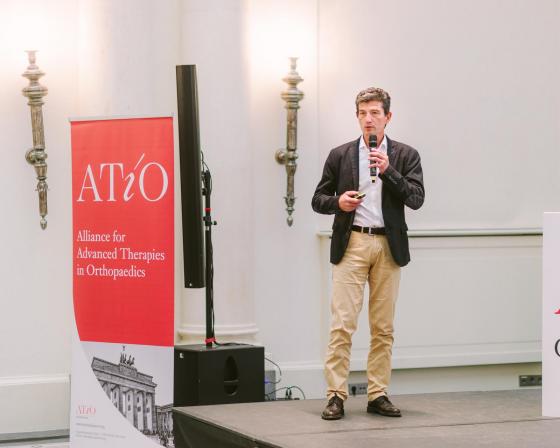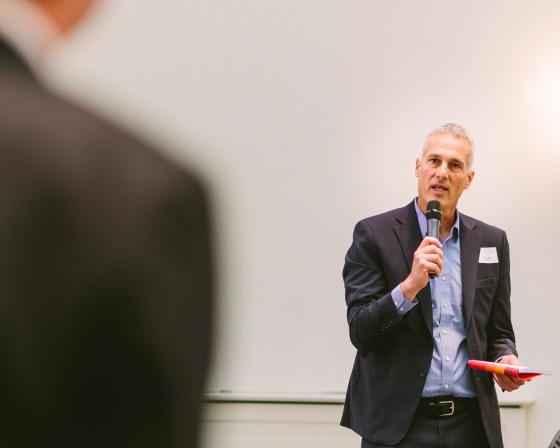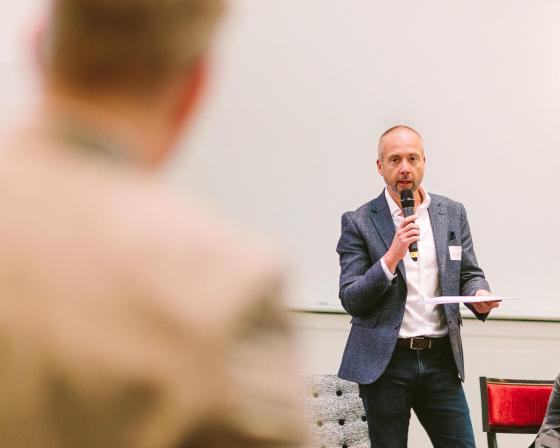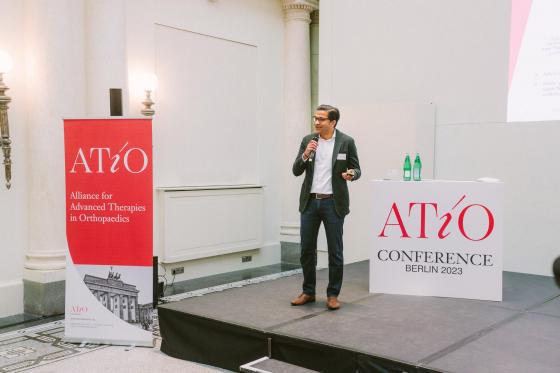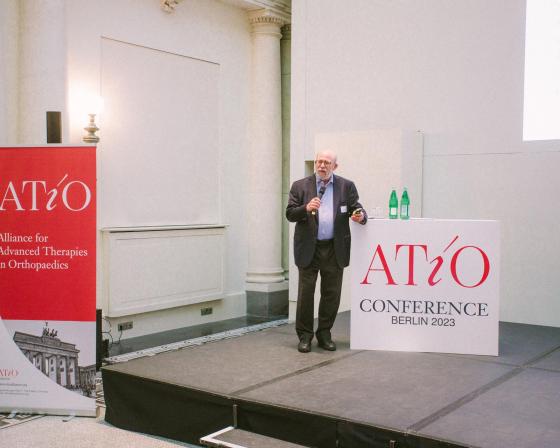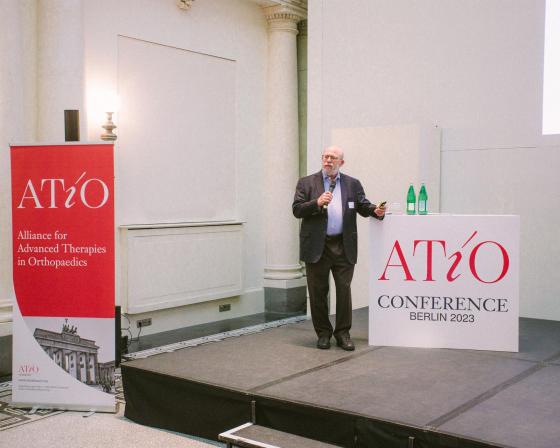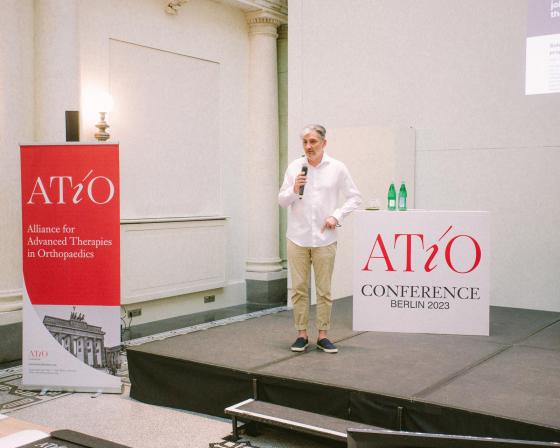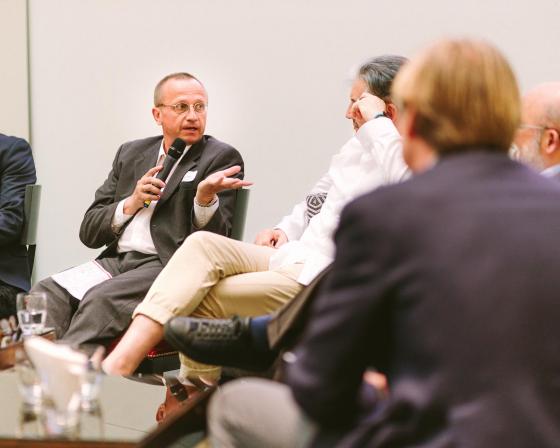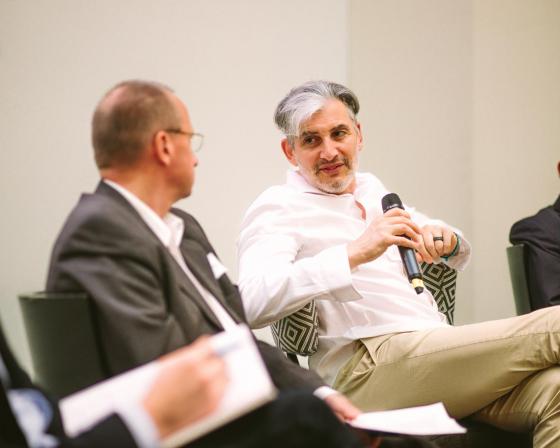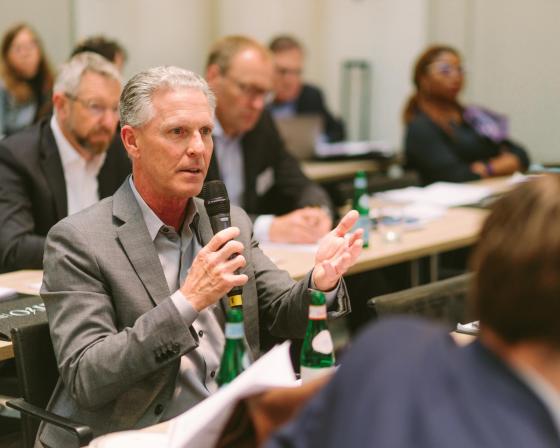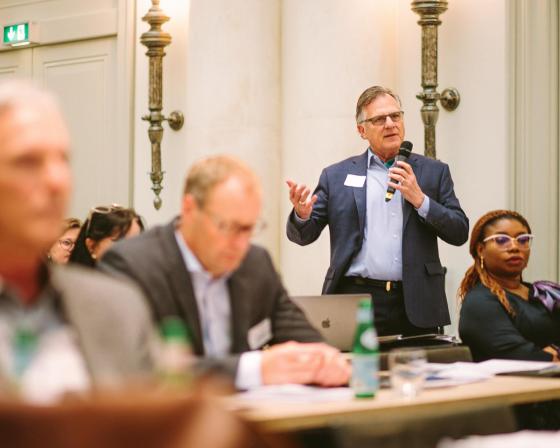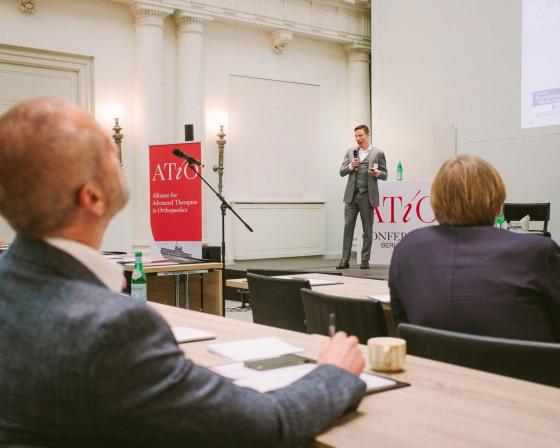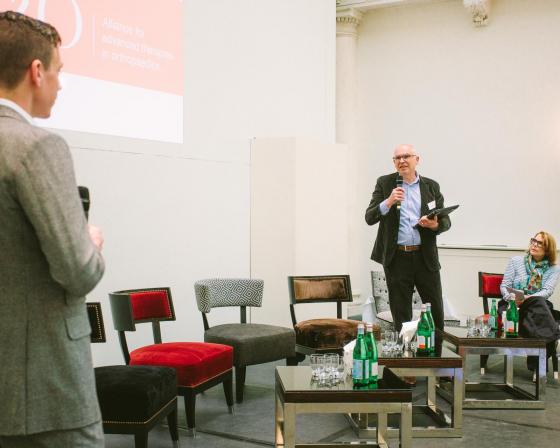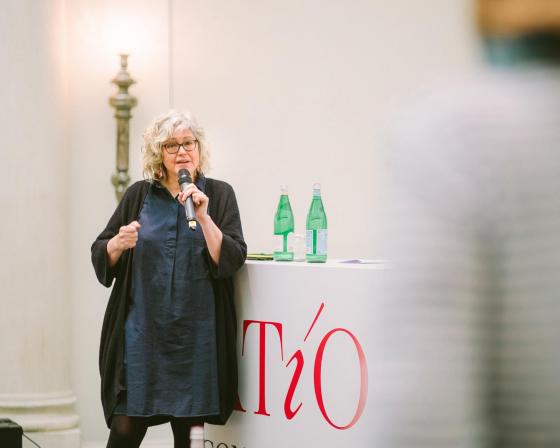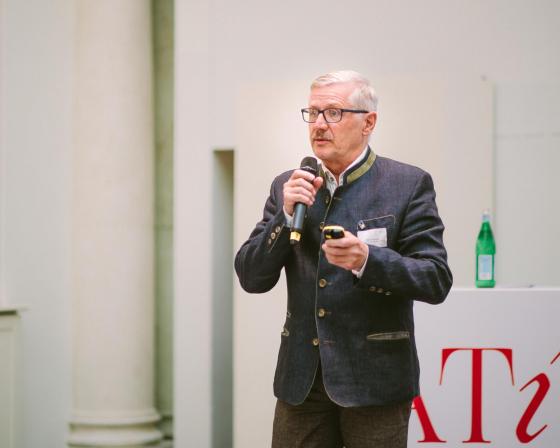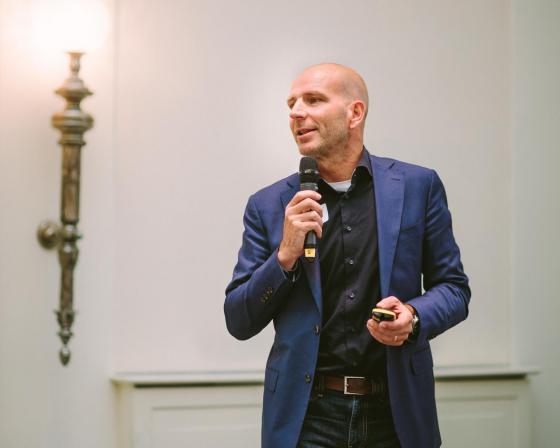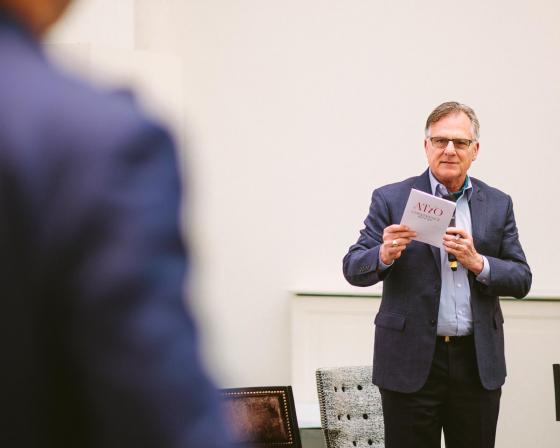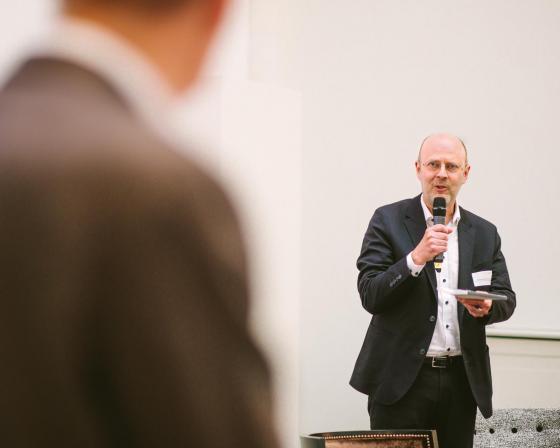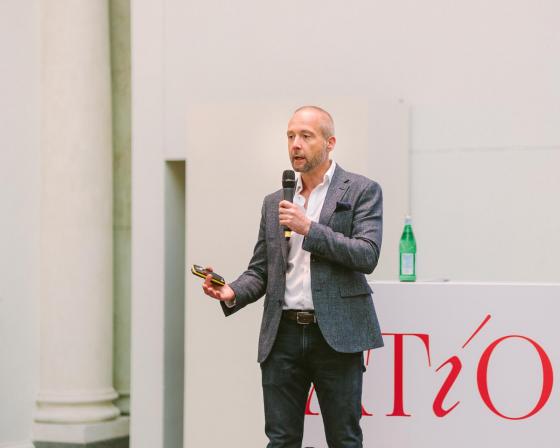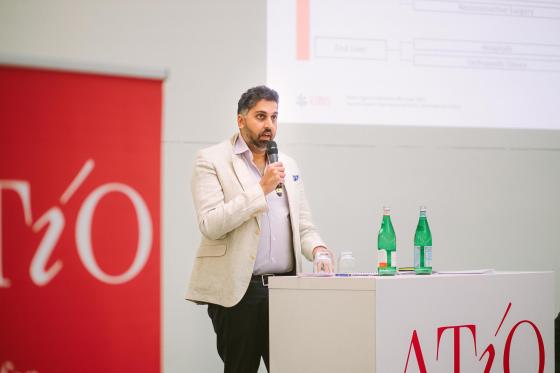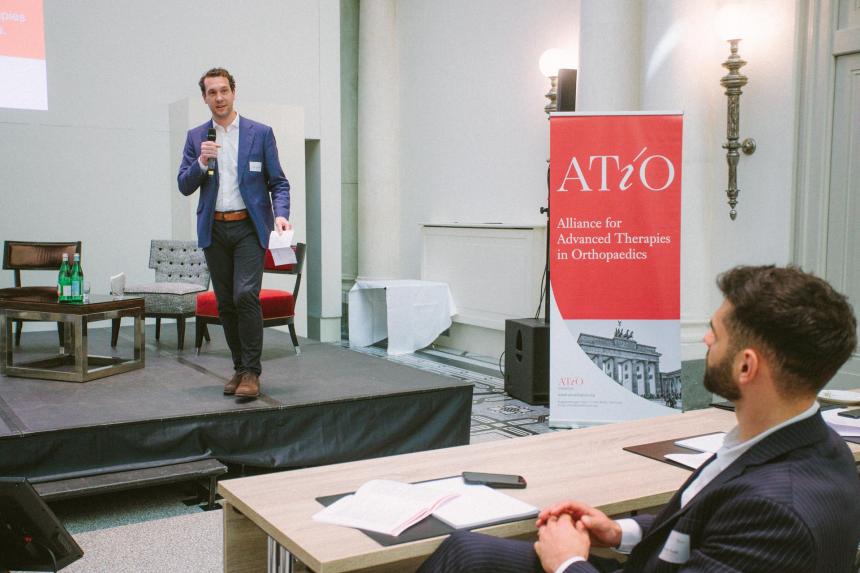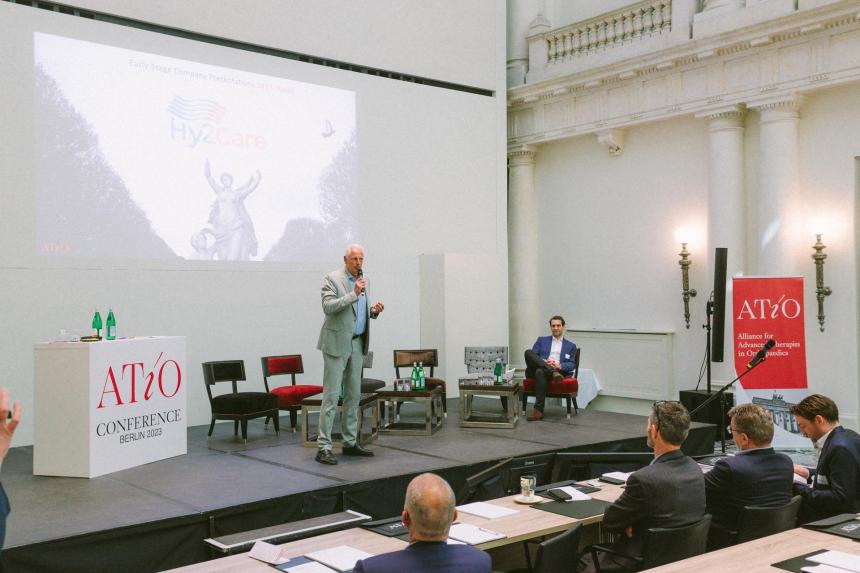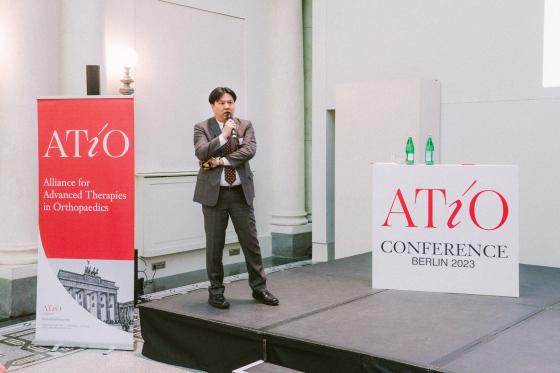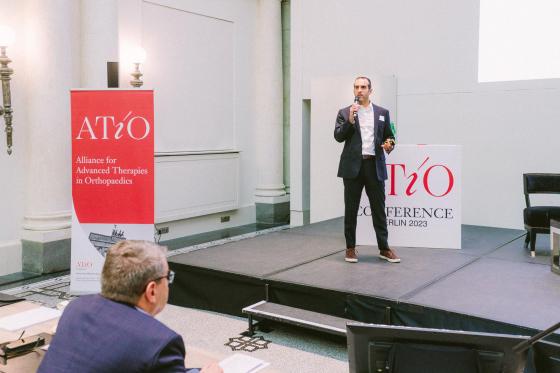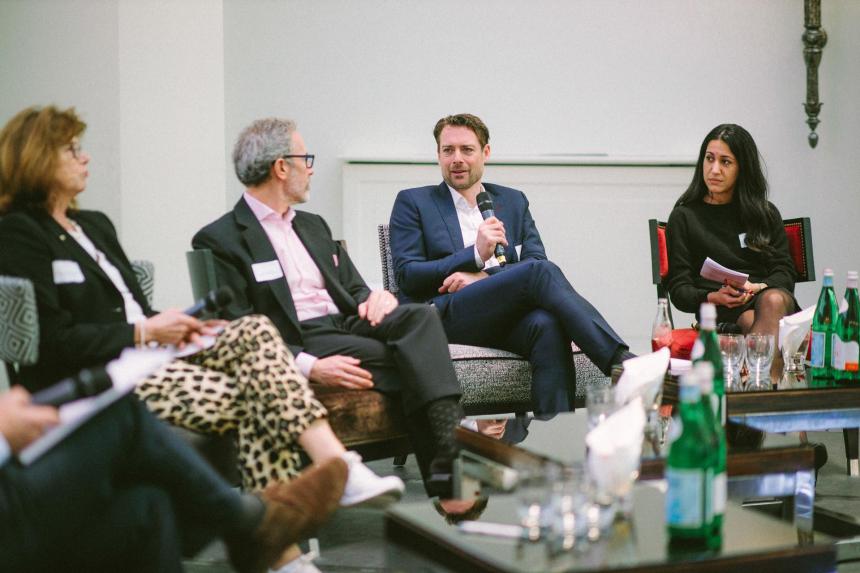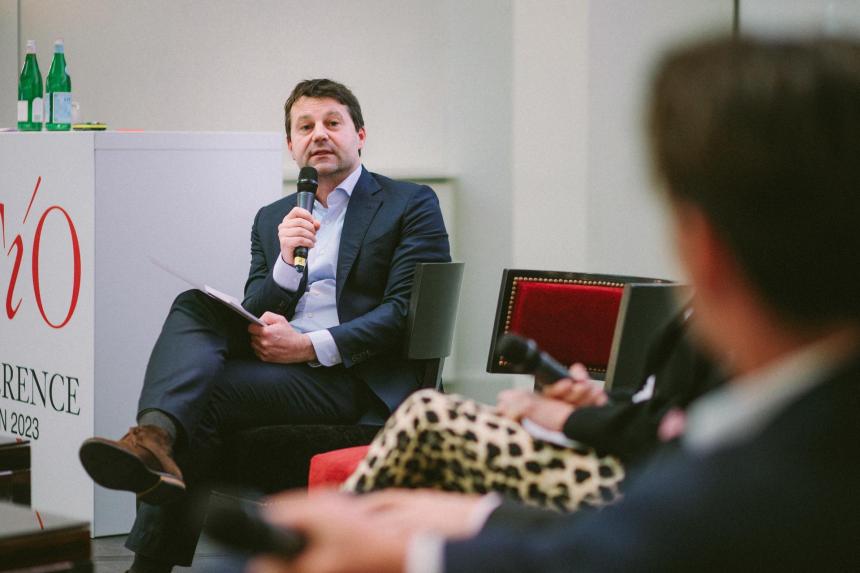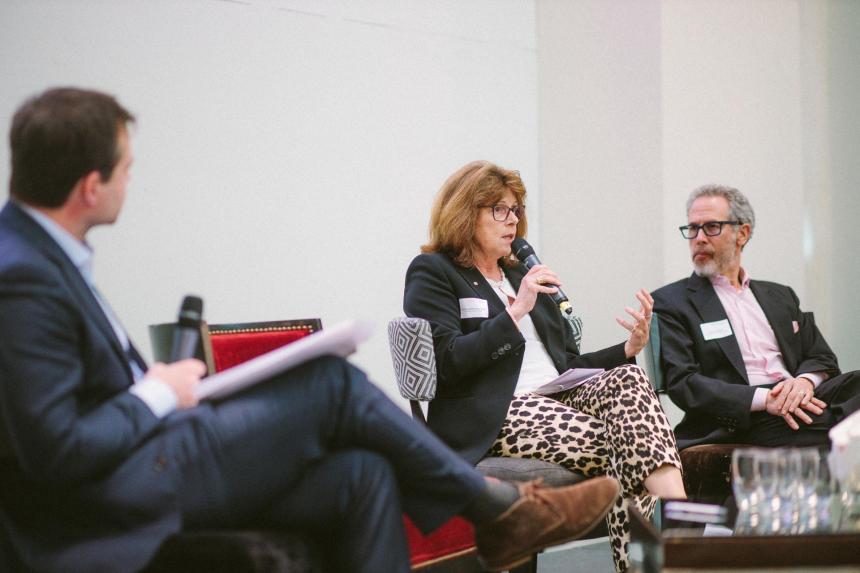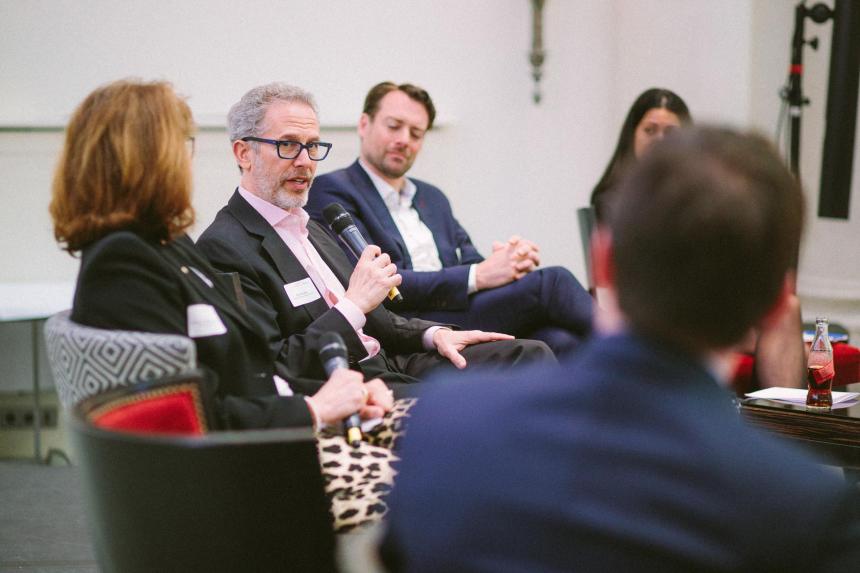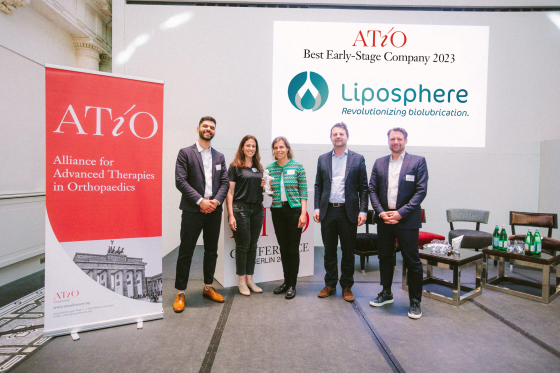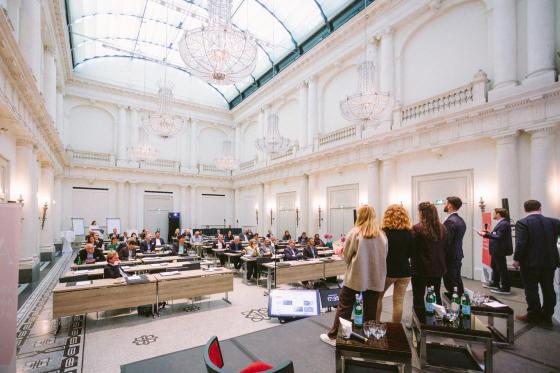ATiO Conference 2023: Summary
The 2nd ATiO Conference staged again at the unique Hotel de Rome in Berlin from the 18th to 20th of May, was the successful sequel of last year’s pioneering conference. Besides, of scaling up the capacities by 25%, we had an even more diverse group of key opinion leaders this year.
The ATiO Conference 2023 was a dynamic gathering that brimmed with diverse viewpoints and engaging discussions surrounding advanced therapies in orthopaedics. It served as a catalyst for fresh ideas and opened doors to foster future collaborations. Here's a brief overview of the notable occurrences at the event.
The Conference kicked off with an opening address by Michiel Bröker, followed by Tobias Winkler providing an update on the ATiO Foundation and its recent advancements. Marc Thurner, the CEO of Mimix Biotherapeutics and winner of last year's ATiO Award, then shared insights into the dynamic developments at Mimix.
The event continued with a series of captivating "Early-Stage Company Presentations" moderated by Emil Billbäck. The lineup featured remarkable early-stage companies such as:
-
OrthoCell (represented by Gregor Maier),
-
Gelmetix (represented by Oliver Schofield & Andy Weyman),
-
TissueFlow (represented by Marcus Jäger),
-
Ankasa Regenerative Therapeutics (represented by Sandy Madigan),
-
Hy2Care (represented by Leo Smit),
-
ArthroSave B.V. (represented by Karianne Lindenhovius),
-
Elute Inc. (represented by Ashok Khandkar).
Before indulging in a delectable dinner, we enjoyed some appetizers while eagerly anticipating the keynote lecture by Prof. Dr. Ivan Martin, the Head of DBM at the University of Basel. Prof. Martin enlightened us on the current state of cartilage repair options and shared promising research insights.
The evening continued with a delightful spread of dinner mains, accompanied by good food, drinks, and a picturesque atmosphere, providing ample opportunities for networking and forging meaningful connections.
Friday began with a networking breakfast generously sponsored by Bonesupport, CO.DON, Heraeus & TETEC, setting the tone for a day of fruitful connections. It marked the commencement of the first of three blocks in our innovative "Research vs. Reaction" format, designed to foster exchange and discussions across various disciplines and professions within the field.
In the "Cell & Gene Therapy" block, we delved into thought-provoking presentations and reactions:
-
Matteo D'Este (AO Foundation) shared insights on "An antibiotic-loaded hydrogel for infection prevention and/or treatment," followed by a reaction from Alyvlin Dias (DSM).
-
Dmitriy Sheyn (Cedars Sinai) presented on "iPCSs – the future of tendon reconstruction," with a reaction by Joost de Bruijn (Kuros Biosciences)
-
Bruno Péault (University of Edinburgh) discussed "Cell lineage committed mesenchymal progenitor cells for targeted musculoskeletal regeneration," eliciting a reaction from Kevin McGowan (MCRA).
-
Ivan Martin spoke about "From nose to knee for cartilage repair," followed by Beat Lechmann’s (Johnson & Johnson) reaction.
-
Tobias Winkler (Charité and BIH & JWI) shed light on "HIPGEN – how to exploit better muscle function in phase III," with a reaction by Christian Ebel (TETEC).
After a refreshing coffee break, we resumed with Group B of the Early-Stage Company Presentations, moderated by Devin Childers. The lineup featured the following promising companies:
-
Kangstem Biotech (presented by Seunghee Lee)
-
LipoSphere (represented by Sabrina Jahn)
-
Disgenics (represented by Flagg Flanagan)
-
Ossium Health (represented by Kevin Caldwell)
-
Trellis Bioscience (represented by Stefan Ryser)
-
Bactiguard (represented by Stefan Grass)
-
Novadip Biosciences (Siegfried Ebner)
Following the completion of the group stage voting, we selected the best companies to proceed to the final pitch on Saturday. A networking lunch allowed attendees to connect further before transitioning to the World Café format, expertly moderated by Stephan Hennrich (Ashurst). Participants engaged in interdisciplinary discussions on various topics led by knowledgeable hosts:
-
Scott Bruder facilitated discussions on "How to navigate regulation of Advanced Therapies?"
-
Temiloluwa Olufemi led the conversation on "How to establish structures and enable advanced therapies in Africa?"
-
Manuela Gomes guided discussions on "How to increase connectivity and impact of the ATiO?"
-
Ulrich Stöckle explored "Defining the Clinical Need in Orthopaedics and Traumatology."
-
Fabian Klein delved into "Intellectual property – how to use as an enabler for development?"
-
Georg N. Duda initiated conversations on "Which incubators do AT need in MSK?"
After a brief break to prepare the results, the hosts presented their findings on stage to the enthusiastic crowd
Next, we transitioned to a panel session moderated by Manuela Gomes, focusing on advanced musculoskeletal therapies in organizations. Several ignition talks laid the foundation for the panel discussion:
-
Enrique Gomez Barrena shared insights into the EFORT approach.
-
Manuela Gomes presented the TERMIS and EORS approach.
-
Anastasia Soulié shed light on the IOF/ESCEO approach.
-
Magali Cucchiarini discussed the OARSI approach.
-
Stefan Nehrer shared perspectives on the ICRS approach.
The panel delved into strategies for advancing the development of advanced therapies within societies. Following a refreshing coffee break, we eagerly gathered for a keynote lecture by Martina Schüßler-Lenz, providing valuable insights into "Regulation of ATMPs from a European Perspective" offering a regulatory perspective for all attendees.
The final block of the day featured a panel session on advanced therapies in musculoskeletal infections, moderated by Martin McNally. The session began with Martin McNally's ignition talk on "the future of therapeutics tests for periprosthetic joint infection". Svetlana Karbysheva then presented "the future of diagnostic tests for periprosthetic joint infection", setting the stage for the panel discussion featuring Michael Diefenbeck, Svetlana Karbysheva, Thomas Kluge, Martin McNally, Andrea Montali, and Stefan Ryser.
We provided a well-deserved break for everyone to refresh before embarking on a short walk to our ATiO Boat, where a delightful dinner catered by CULINARIUM awaited. As we cruised along, embracing the beautiful sunset, the evening offered a memorable experience for all.
Our last day began with the exciting second block of our "Research vs. Reaction" format, focusing on biomaterials, biomarkers, and biomolecules. Under the expert moderation of Georg N. Duda, we explored a range of engaging presentations and reactions:
- Ben Freedmann presented "Janus tough adhesive hydrogels for tissue repair and regeneration," followed by a reaction from Shamim Dadvar.
- Jill Helms discussed "WNT-based therapeutic strategies," with Emil Billbäck providing a reaction.
- Katharina Schmidt-Bleek shared insights on "Local immunomodulation to enhance regeneration," eliciting a reaction from Sebastian Winsel.
- Pierre Layrolle presented on "Clinical bone regeneration with stem cells and biomaterials," with a reaction from Yaky Yanay.
- Alex Hughes delivered a thought-provoking talk on "Developing the next generation of quantitative biomarkers for innovative therapies in spinal degenerative disease," followed by a reaction from Devin Childers (Heraeus USA).
- Xin Xiong presented "Multi-ion functionalized bone substitute materials,".
Following a refreshing coffee break, we were delighted to have Niladri Chattopadhyay, the director at Bayer Pharmaceuticals, delivering a captivating keynote. Niladri Chattopadhyay shared fascinating insights into Bayer's global cell and gene therapy strategy, providing valuable information for the crowd.
Next, we engaged in a panel session moderated by Stefan Nehrer, focusing on clinical study outcome parameters. Lee Simon initiated the discussion with an ignition talk on the osteoarthritis initiative, followed by Steve O'Keeffe, who presented the perspective of angry patients through his organization, Angry@Arthritis. The panellists, Christian Ebel, Henning Madry, Stefan Nehrer, Steve O'Keeffe, and Lee Simon, engaged in an interesting conversation, highlighting the discrepancies between the patients' and professionals' viewpoints.
Before our well-deserved lunch break, we had a thought-provoking presentation on "Ortho Structures in Nigeria – A West African case on challenges and opportunities" by Temiloluwa Olufemi.
The third and final block of our "Research vs. Reaction" format focused on Osteoarthritis and Cartilage and was expertly hosted by Jill Helms. The presentations included:
-
"Anti-inflammatory small molecule approach for osteoarthritis" by Ben van Handel with a reaction by Eckhard Weber,
-
"Microtissue stromal vascular fraction for regenerative medicine" by Susanne Wolbank with a reaction by Michael Diefenbeck,
-
"If you want bone, you need cartilage" by Dirk Strunk with a reaction by Zami Aberman,
-
"ACI vs minced cartilage: evidence vs market and role measurement-control" by Pieter Emans,
-
"mRNA therapies for MSK" by Martijn van Griensven with a reaction by Christoph Conrad.
After an enriching day of research-related discussions, we shifted our focus to business trends and enablers in advanced therapies. Nishant Pandey delivered a compelling talk on Business Development and M&A Trends in Advanced Therapies, followed by Martjin van Griensven sharing insights on enablers for advanced therapies at the MERLN institute.
A keynote by Julie Allickson, the head of regenerative medicine at the Mayo Clinics, followed a refreshing coffee break. Julie Allickson provided valuable insights into growing regenerative biotherapeutics with a patient-centric approach and showed hands-on how we can implement and realize those concepts.
To conclude the pitch contest, we staged the final round of the Early-Stage Company Presentations, where each company delivered captivating and interactive presentations. The close voting among all the companies reflected the dedication and passion of the presenters, leaving the audience with a difficult choice to make in the final voting.
We were honoured to have Chun-Nan Chen provide insights into regenerative trends in China, highlighting innovative approaches and the key to innovation in the region.
Scott Bruder, the esteemed global expert in orthopaedics and trauma, passionately captivated the audience as he unveiled an inspiring presentation on the exhilarating world of advanced therapies in orthopaedics. With infectious enthusiasm, he divulged the most cutting-edge sector trends and groundbreaking breakthroughs. His invaluable insights provided a transformative perspective, offering a treasure trove of crucial outlooks and emerging tendencies for each and every participant to carry home with them.
Then, Mario Fabiilli (University of Michigan & FU Foundation) showcased innovative approaches and techniques for the utilization of Focused Ultrasound in advanced therapies, opening new perspectives and ideas.
Lastly, we held the panel session "Advanced Therapies: Vision 2023 – Opportunities and Obstacles," moderated by Michiel Bröker (UBS), featuring insightful discussions with panelists Scott Bruder, Shamim Dadvar, Martina Schüßler-Lenz, and Tobias Winkler on barriers, challenges and perspectives in the field.
The pinnacle of the event was the highly anticipated ATiO Award Ceremony. After careful deliberation, Liposphere, represented by Sabrina Jahn & Ronit Goldberg, emerged as the winner for their groundbreaking approach to the treatment of damaged cartilage. They were crowned with the ATiO Award for "Best Early-Stage Company 2023", a well-deserved recognition of their exceptional work.
To wrap up the conference on an optimistic and energetic note, our executive board members Tobias Winkler and Michiel Bröker delivered a closing address, summarizing the key takeaways and leaving attendees inspired for future endeavours.
